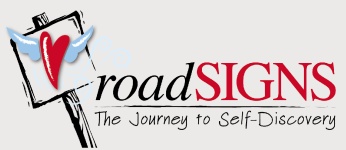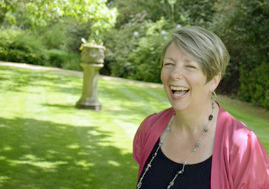I am delighted to have Aileen Gibb as a guest blogger today on the roadSIGNS Coach. I first met Aileen in 1998 at the Higher Ground Community Retreat. As a master coach, Aileen has touched many lives around the globe including mine. I was privileged to be a reviewer for her new book Voices. Enjoy Aileen’s blog, More than Words.
I’m always inspired when Betty finds an unusual road sign to convey a message for her readers. I was similarly struck by an experience beyond words recently when I checked in to the 14th century Manor House Hotel in the historic village of Castle Coombe, England. A charming young man valiantly pulled my heavy suitcase along what looked like a street of cottages from bygone times. Yes, this row of cottages had been converted into luxurious hotel rooms with amenities a far cry from those their original inhabitants would have known. Mixed emotions flitted through me as we passed by this charming row of cottages to a lone cottage on its own at the end of the lane. Was I being stuck in the outhouse? Of course not – my cottage turned out to be a little house on its own, separated from the very centre of the charming town itself only by five-foot thick walls of hand-hewn sandstone. My chaperone bent down, hobbit fashion, to open the door to my cottage and welcome me in. Imagine my joy at finding I had my own little house for the next five days. A real log fire, which I just had to light one afternoon; a comfortable bed with a choice of six different kinds of pillows, from which I would gaze up into the old oak rafters; and a traditional-looking, yet thoroughly modern bathroom with rain-shower, claw-foot bath and endless hot water. This was turning into an experience beyond expectations and beyond what words can really convey. A picture might help:
Sometimes we need more than words to capture the real situation. We need to experience it. And sometimes words convey so much more than the initial, or superficial experience we encounter. Take the thoughtfully provided toiletries in this already memorable hotel room. I was struck by the clever spin on words that some creative product designer had come up with – words that took me to an experience beyond using them for my daily ablutions. An ordinary soap bar labelled “SOAP BOX – JUMP ON” – well that’s an invitation it doesn’t take me long to respond to. A cleansing lotion titled “TAKE THE DAY OFF” extends an invitation to remove the murk and grime of a busy city workday and replace it with a sense of relaxation or even playing hooky. And a kit of manicure essentials promises to “MEND A HAND”. These plays on words create visceral and emotional responses to everyday items. And they make me think about the words and language we use in everyday life and leadership.
In many organizations, I find myself listening to clients who seem to have a language of their own: three letter acronyms, buzz words and jargon terms which have long-ceased to have meaning for the increasingly dulled ears on which they fall. Fighting to be heard amidst cryptic text messages, email pings, or even re-runs of last evening’s TV reality show.
Where, I ask, are the quality conversations? The meaningful questions which inspire deep contemplation of possibilities and solutions? The focused listening – not for what has gone before, rather for what is really needed and waiting to emerge? My colleague and mentor, Ian Wallace of the Dream Organisation in Scotland, makes the distinction between communication (usually the one-sided transmission of information and data) and conversation (which literally means to turn something around together).
Every team or organization I have worked in for the past twenty years has, at some point said “we need better communication around here”. I’m convinced that what we really need is “better conversation”.
And better conversation invites better awareness as to the impact of the words we choose the questions we ask, the listening we demonstrate, the voice we use – all wrapped up in the experience of being fully engaged with another person. My coaching clients will often say they can’t get the type of conversation they have with me, anywhere else in their organization. This saddens me. And it inspires me to equip those same leaders to in-turn lead conversations that make a difference. When those leaders pay attention to their words and invite people into conversations that meet their individual needs, then I believe we’ll see a shift. A shift from dominating the conversation, as the Lord of the Manor might have done in the 14th century, to listening truly for the real voices and for more than what simple words convey.
About Aileen Gibb:
Aileen Gibb is an inspirational coach, facilitator and leader whose work has taken her around the globe. She has worked with leaders and teams in Kazakhstan, Venezuela, the Middle East, France, Angola and in many companies in the UK and North America, to uncover new possibilities and transform results. Where she has travelled she has been amazed at the power of coaching-style conversations and the choices people make to become more successful in their work and to live more fulfilling lives. Aileen is from the small village of Fyvie, in North East Scotland and has lived for the past twelve years amidst the rocky mountain in Canmore, Alberta, Canada with her husband, Jake and their two boxer dogs. Aileen thanks you for your interest in VOICES, please let her know how it inspires you. http://www.aileengibbvoices.com
https://www.facebook.com/aileengibbVOICES
About Voices:
VOICES is a series of connected coaching stories which reflect many of the real-life choices people might consider making to live the life they truly wish for. All the stories are fiction and her hope is that one of the stories – or one of the questions in one of the stories – might resonate with your life story and invite you to make a choice. The coaching stories are interwoven with the musings of a future-guide who travels to and from a parallel time, considering what the key messages are for inspiring a better future society.
VOICES is available for purchase now and although Aileen has some upfront costs to recoup, as soon as it starts to generate profit, funds from the book sales will be going to support people going through cancer to access complementary therapies such as acupuncture, which are proven to mitigate the extreme fatigue and other side-effects of cancer treatments. http://www.aileengibbvoices.com




